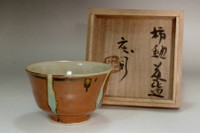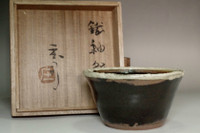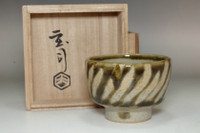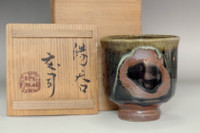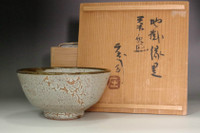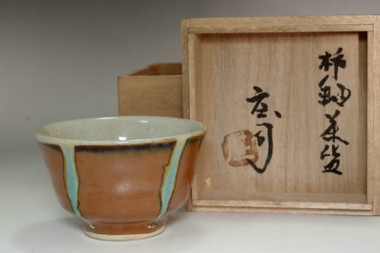 Loading... Please wait...
Loading... Please wait...Currency Displayed in
- Home
- SOLD ITEMS
- Hamada Shoji (1894-1978) Small vintage mashiko pottery bowl #4370
Categories
Hamada Shoji (1894-1978) Small vintage mashiko pottery bowl #4370 for sale
Product Description
Up for sale is this "Hamada Shoji (1894-1978) Small vintage mashiko pottery bowl #4370" If you have any questions please contact us before buy it. No reserve.
- width: approx. 9.8cm (3 55⁄64in)
- height: approx. 6.2cm (2 7⁄16in)
- weight: 188g (w/ box 305g)
Hamada Shoji (1894-1978)
Hamada Shoji was a renowned craftsman and representative figure in modern Japanese pottery. Born in Tokyo in 1894, he resolved to become a potter while still a student at Furitsuicchu (the Tokyo First Prefectural Jr. High School, Hibiya high school at present). After studying ceramics at the Tokyo Higher Technical School (present-day Tokyo Institute of Technology), Hamada joined the Kyoto Municipal Ceramic Laboratory, where he would meet his lifelong friend, Kawai Kanjiro. As Hamada later summarized the narrative arc of his career, “I found the path in Kyoto, began my journey in England, studied in Okinawa, and developed in Mashiko.” In 1920, he accompanied Bernard Leach to England where he began his practice as a potter. When the time came to return home to Japan, he sought a quiet life in the countryside, and situated himself in the town of Mashiko in 1924. During this period, he also made an extended sojourn in Okinawa, which became the inspiration for a large number of works. In 1930, he relocated the building which would later become the main residence of his compound (later donated to the Ceramic Art Messe Mashiko), and in the years up until 1942, transplanted many traditional old houses onto the premises to create a workshop and residence. It was from this base that he founded the Mingei folk-art movement along with cohorts Yanagi Soetsu and Kawai Kanjiro, which was to have a significant impact on the Japanese craft world. In 1955, Hamada was recognized along with Tomimoto Kenkichi et. Al. as an inaugural recipient of the Japanese government’s “Preserver of Important Intangible Cultural Properties” (Living National Treasure) designation, and in 1968, became the third potter to be awarded the prestigious Order of Culture.
The Mingei Movement
The Mingei (folk-art) movement was initiated by Yanagi Soetsu, Kawai Kanjiro, and Hamada Shoji in 1926 (Taisho 15) as an approbation of functional craftwork used by the masses in the course of daily life. At the time, the craft world was dominated by decorative pieces prized for their aesthetic value. In response, Yanagi and cohorts promoted the quotidian lifestyle implements handmade by anonymous craftsmen as mingei (“craft of the common folk”), arguing that such works have a beauty that rivals fine art, for beauty can be found in the everyday. A further pillar of the movement introduced a “new way of looking at beauty” and “aesthetic values” via the notion that crafts born from the local practices and rooted in the rhythms of the rural regions of Japan embody a utilitarian, “healthy beauty.” Their ideology was, in many ways, related to the era, marked as it was by the advance of industrialization and tandem gradual influx of mass produced products into the sanctum of daily life. Troubled by the loss of “handicraft” across Japan, the Mingei movement warned against the easy progression of modernization/Westernization. In this way, the Mingei movement served as a vehicle for the artists to pursue the question of what constituted a good life, rather than simply a life rich in material wealth.
Mongama
A kiln of Mashiko-ware pottery headed by Hamada Shoji. Since establishing the kiln in 1931, Hamada and his disciples have presented many works in succession using Mashiko traditions and materials. Mashiko's recent rise to prosperity as a major production area for folk-craft ceramics has been greatly influenced by the ceramic-making activities of this site. Hamada's achievements were recognized in 1955, when he was designated as the first individual holder of Intangible Cultural Property (Living National Treasure). Following his death, Hamada's son Shinsaku took over the kiln and has been teaching highly reputed potters.
shop policy
AppraisalWe are a very small team with limited resources and are unable to conduct scientific age verification or appraisals by the artist’s descendants. We evaluate items using specialized reference books, scholarly resources, and knowledge inherited from senior experts in the field. If a purchased item does not meet your expectations, please feel free to contact us. We sincerely value your opinion.
Cancellation and Return
We accept return only if you contact us within 30 days after you receive the items. Return-shipping costs are the buyer’s responsibility. If you ask a cancellation before shipping the package, we may ask a 20% restocking fee.
Shipping
+ Shipping to the USA, Europe, and Asia is free. For other areas, please contact us. Shipping is via EMS or DHL.
+ VAT is not included in the item price.
+ We will ship within 3 business days. Shipping time is usually around a week.
Insurance
We are not responsible for delays, returns, damage or loss due to customs or postal processing. EMS is insured (the amount on the label is the guaranteed amount). If you choose DHL, we recommend that you purchase additional insurance. Please note that if you choose the DHL drop service option, insurance will not be applied.
Taxes
Import duties, taxes and fees are not included in the item price. If your country requires customs duties, etc., it is your responsibility to pay them.
To customers buying tableware
Our products are mostly used. We sell them in the same condition they were purchased, please be sure to clean them thoroughly before actually using them.

